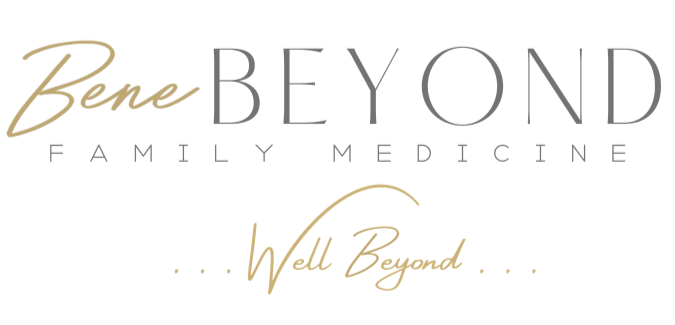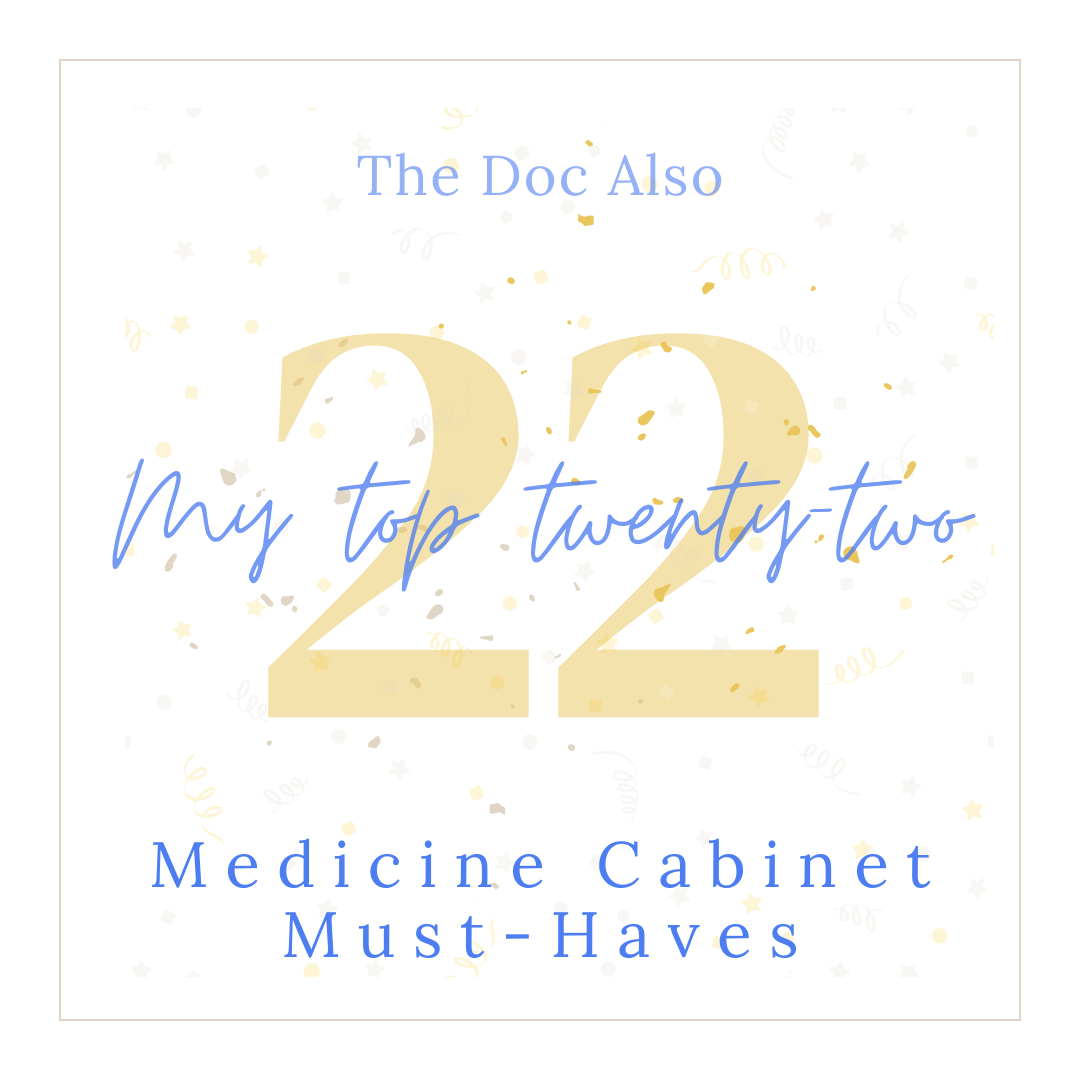Hey All! I’m getting a bit of cleaning done at home and checking expiration dates on my home medication supply. Even though I have access to prescription meds, there are some over-the-counter items that I always want to have on hand. I’ve compiled a list of my most used meds. Keep in mind that this list is what I use for my family. I don’t have very little kids anymore (I’m quickly becoming the shortest person in my house). This list is not designed to be a substitute for talking with your doctor about which over-the-counter remedies are safe for you and your family. But a list like this may be helpful for someone moving into their first apartment or anyone staying in a long-term vacation rental. It will also help if you’re like a lot of patients that I encounter that don’t have ailments often, so they don’t have many meds on hand. And then there are those that still have access to mom and dad’s stock, so they’ve never gotten their own… Anyway, without further delay, here are my picks. Enjoy!
- Acetaminophen – This is the generic medication found in brands like Tylenol. It is a pain reliever and fever reducer that is processed primarily in the liver (spares the kidneys). It is generally safe for use in pregnancy and children.
- Ibuprofen – This is the generic medication found in brands like Advil or Motrin. It is a pain reliever, fever reducer and anti-inflammatory medication that is processed primarily by the kidneys. It is not used in some stages of pregnancy and childhood, so check with your doctor. There are some chronic conditions for which we should avoid this class of medication (non-steriodal anti-inflammatory drugs – NSAIDs).
- Diphenhydramine – This is the generic medication found in Benadryl and in some PM pain medication preparations. This medication is an antihistamine which can help with allergies. It also can induce sleep, so it’s often used for insomnia and sometimes anxiety. It is usually taken at night because it can cause drowsiness.
- Cetirizine – This is the generic medication found in Zyrtec. This is my preferred non-drowsy antihistamine formulation for my family. We go through a lot of cetrizine during allergy season. It is also safe for use in pregnancy and in children, but remember different sized people need different doses.
- Hydrocortisone Cream – This is the generic medication found in brands like CortAid. This is very helpful for itching and rash. I have eczema in the family and use this medication often. I get several tubes of this med and stash them all around the house. Anytime I see mindless scratching, I start my regimen of hydrocortisone and moisturizing.
- Benzocaine Oral Gel – This is the generic medication found in brands like OraGel and Anbesol. This is very handy when one has a toothache or if you’re trying to pull a loose tooth. It doesn’t taste good, but the mouth will be come very numb wherever you put it. So be careful not to use or swallow a lot at one time as this could affect swallowing function.
- Calcium Carbonate – This is the generic medication found in brands like TUMS. I use this for infrequent acid reflux in-progress as well as for calcium replacement in those that are deficient. It tastes pretty good (especially compared to other medications) and are chewable. These are also safe for use in pregnancy and children.
- Famotidine – This is the generic medication found in brands like Pepcid. I keep this on hand for use in acid reflux. It works rather quickly, so you can use it as needed after symptoms begin. You can also take it at scheduled intervals if needed. There is a stronger prescription dose if needed, so talk to your doctor if the over-the-counter dose is not enough to relieve your symptoms.
- Melatonin – I love this sleep aid. Melatonin occurs naturally in the body. When melatonin levels are high, that signals the body to get sleepy. I love the gummy formulation of this medication, just make sure your kids know it’s not candy.
- Clotrimazole – This is the generic medication is an anti-fungal medication used on the skin. You can try it for things like ringworm and jock itch. I also recommend that if you have someone prone to either, have them put on their socks before putting on their underwear and dry their feet last after bathing.
- Trimacinolone Nasal Spray – This generic medication is found in the brand found in NasoCort. I have used other steroid nasal sprays; however, this one doesn’t taste bad – so I have an easier time getting the big strong guys in my family to take it. Me on the other hand, I like breathing clearly, no matter how bad it tastes.
- Hydrogen Peroxide – I don’t use this regularly in wounds as some studies find that it delays wound healing, but it is excellent at getting blood stains out of fabrics. I also use it as a mouth rinse at times. DO NOT SWALLOW THIS. H20 and H202 are very different in the body (sorry, nerd joke).
- Isopropyl Alcohol – This can be used to help clean the skin and help sanitize surfaces. FYI – it sets blood stains in fabrics (learned that the hard way). You do NOT have to rinse out open wounds with isopropyl alcohol unless you just hate the wounded individual. Using LOTS of running water to clean the lesion is recommended. Save the isopropyl alcohol for cleaning intact skin.
- Benzoyl Peroxide – This generic medication is found in many acne preparations. I like getting the 10% formulation used in “spot treatment”. This is the strongest formulation available over-the-counter. I use this for acne breakouts. Remember that this can “bleach” (discolor) your linens, so I use it during the day or make sure that my bedding / towels are white, or I just use the mediation during the day. Truthfully, I usually use it at night because I like waking up with the pimple GONE.
- Carbamide Peroxide – This is the generic medication found in brands like Debrox for earwax cleaning. As a reminder, you should not stick anything in your ear further than you can stick your little finger. That means shoving a cotton swab deep into the ear canal is a no-no. If you want to clean the wax from your ear, its recommended to use something to break down the earwax (also called cerumen) and then gently rinse it from your ears with a warm water flush. Do not use a power blaster (i.e. WaterPik) to clean your ears. The ear canal and ear drum are too fragile for this and you will cause a problem at some point. For patients that produce a lot of earwax, I usually tell them to get on a monthly or biweekly (if necessary) routine of doing this.
- Aspirin (acetylsalicylic acid) – This generic medication is used as an anti-inflammatory, fever-reducing, pain medication. This medication is often used for heart conditions but can be dangerous for children and should not be given to anyone under 17 unless prescribed by a doctor. But for those of us over 40, they may start adding it to the water (just kidding). Check with your doctor to see if aspirin is safe for you to take, especially with certain stomach or liver conditions.
- Sodium Bicarbonate – This powder is commonly known as baking soda. I use it religiously for my teeth. My mouth just doesn’t feel fully clean without it. It helps whiten with the helps of hydrogen peroxide. I also use it with water to remove dry skin from my lips. I have a really round face, so my smile is VERY important for my look. It also works great in the kitchen, but that’s a post for another day.
- Petroleum Jelly – I use this on my skin after a shower to lock in moisture (if you have a medicated cream to use, the petroleum jelly should go on after the medicated cream). Studies have shown that petroleum jelly can be used on wounds as is as effective as triple antibiotic ointment without the risk of creating resistant bacteria or allergic reactions.
- Bandages – Having bandages of different sizes, shapes and types helps. I generally have adhesive bandages for small cuts, nonstick gauze, an ACE bandage and some self-adherent wrap I my bandage stash. Admittedly, I don’t use it often, but it’s nice to know I have it when I do need it.
- Heat Pad – This could be a disposable warmer or an electric warmer. Muscle cramps often respond well to heat. I try this first for menstrual cramping and back ache. You will be surprised how often it works without any other intervention.
- Cold Compress – Again, this could be a disposable pack or one that can be reused. Inflammation often responds well to cold. Try this for joint sprains. Just remember to keep an eye on the skin in the area of treatment so that it doesn’t get frost bitten.
- Thermometer – This is essential. Hands make terrible thermometers. “He felt warm to me” is not an accurate measurement of temperature. For the love of God, please, get a thermometer. Objective data is the best kind of data. Remember to take the temperature before taking any fever – reducing medication. Also, if the temperature is being taken orally, drinking a cold beverage could affect the temperature. If using a forehead thermometer, air conditioning (or the lack thereof) could affect the temperature depending on your climate.
So there you have it… my top 22 must-haves for your medicine cabinet. Of course there so many things that you could add depending on your situation at home. So use this as a starting guide if you need to, but by all means, make your medicine cabinet personalized to your family’s needs. Until next time…
Be well.
-Dr. A
______________________________________________________________________________
DR. A’s MEDICINE CABINET MUST-HAVES
Organized by Type / Use
| MED TYPE | GENERIC NAME | BRAND NAME |
| Allergies / Sleep | Diphenhydramine | Benadryl |
| Allergies | Triamcinolone Nasal Spray | Nasocort |
| Allergies | Cetirizine | Zyrtec |
| Antifungal | Clotrimazole | Lotrimin |
| ENT | Carbamide Peroxide | Debrox |
| Gastrointestinal | Famotidine | Pepcid |
| Gastrointestinal | Calcium Carbonate | TUMS |
| Oral | Sodium Bicarbonate | Arm & Hammer Baking Soda |
| Oral | Benzocaine | OraGel |
| Pain / Fever / Inflammation | Ibuprofen | Advil, Motrin |
| Pain / Fever / Inflammation | Aspirin (Acetylsalicylic Acid) | Bayer Aspirin |
| Pain / Fever / Inflammation | Acetaminophen | Tylenol |
| Skin | Benzoyl Peroxide | Clearasil, Persagel |
| Skin | Hydrocortisone | CortAid |
| Skin | Hydrogen Peroxide | Peroxide |
| Skin | Isopropyl Alcohol | Rubbing Alcohol |
| Skin | Petroleum Jelly | Vaseline |
| Sleep | Melatonin | Melatonin |
| Supply / Tool | Bandages | BandAid |
| Supply / Tool | Thermometer | Braun |
| Supply / Tool | Cold Compress | Cold Compress |
| Supply / Tool | Heat pad | Heating Pad |



